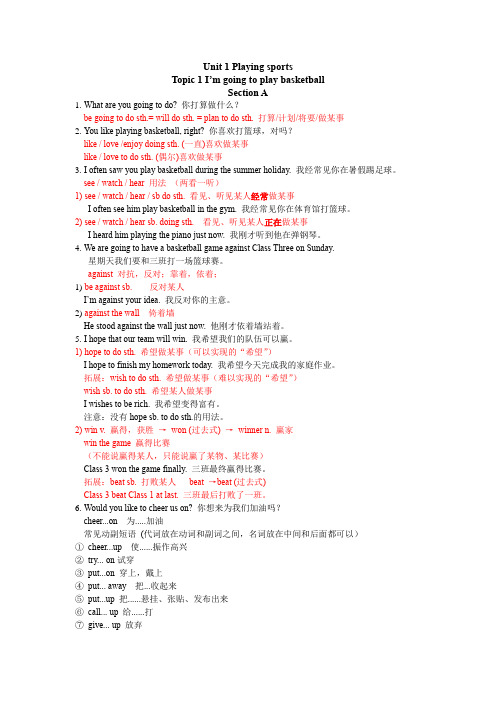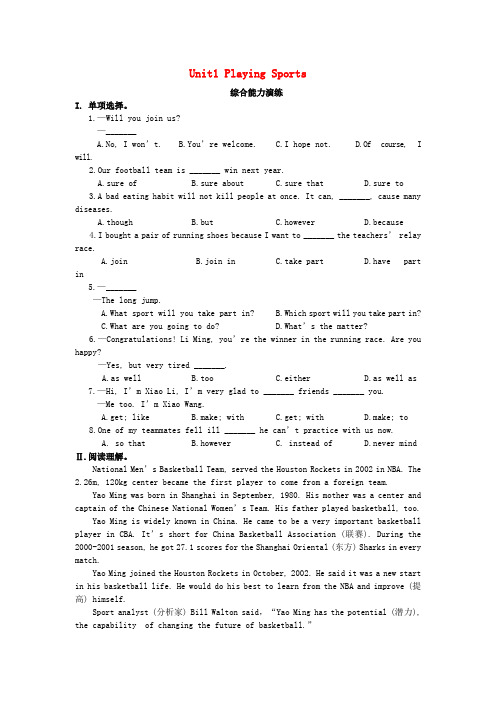Unit 1 Playing Sports
- 格式:doc
- 大小:971.50 KB
- 文档页数:5

Unit 1 Playing sportsTopic 1 I’m going to play basketballSection A1.What are you going to do? 你打算做什么?be going to do sth.= will do sth. = plan to do sth. 打算/计划/将要/做某事2.You like playing basketball, right? 你喜欢打篮球,对吗?like / love /enjoy doing sth. (一直)喜欢做某事like / love to do sth. (偶尔)喜欢做某事3.I often saw you play basketball during the summer holiday. 我经常见你在暑假踢足球。
see / watch / hear 用法(两看一听)1) see / watch / hear / sb do sth. 看见、听见某人经常做某事I often see him play basketball in the gym. 我经常见你在体育馆打篮球。
2) see / watch / hear sb. doing sth. 看见、听见某人正在做某事I heard him playing the piano just now. 我刚才听到他在弹钢琴。
4.We are going to have a basketball game against Class Three on Sunday.星期天我们要和三班打一场篮球赛。
against 对抗,反对;靠着,依着;1)be against sb. 反对某人I’m against your idea. 我反对你的主意。
2)against the wall 倚着墙He stood against the wall just now. 他刚才依着墙站着。

Unit 1 Playing SportsTopic 2 I’ll kick you the ball again.Section A1.Could you help me?你能帮助我吗?--Sure/Of course. 当然。
⏹help sb (to) do sth.=give sb a hand=help sb=do sb a favor2.We are going to have a soccer game against Class Five on Saturday.But one of my teammates fell ill. Will you join us?⏹be going to do 将要做…⏹have a soccer game 足球比赛⏹One of +代(复)/名(复)+…..“其中之一”,做主语时,谓语动词要用单数。
Eg:One of my teammates was ill.One of them comes from Italy.⏹fall ill= be ill 生病 fall—fellill和sick都表示生病的,ill只能做表语,sick可以做表语和定语⏹will you 请求用语⏹join+人/组织 join in=take part in 加入某个活动3.I'd be glad to. But I am not very good at it. Would you mind teachingme?-- Not at all. You can do it! Let's go and practice.⏹be glad to do 高兴做某事 be good at=do well in 擅长…⏹Would you mind doing sth.?你介意做某事吗?Would you mind not doing sth.?你介意不要做某事吗?用于请求允许。

Unit 1 Playing SportsTopic 1 I'm going to play basketball一、核心词汇during against team win practice join famous weekend heart healthy popular relax player leave pity future musician scientist二、常用词组see sb do sth 看见某人做过某事cheer...on 为...加油grow up 成长,长大成人play for 效力于,为...打球in the future 今后be good at擅长于....take part in 参加,加入the high jump 跳高the long jump 跳远be good for 对...有益the day after tomorrow 后天keep healthy/fit 保持健康a good way to 一个...的好办法arrive in 到达leave for 动身去某地三、重要句型:1、I often saw you play basketball during the summer holiday 。
2、I hope our team will win 。
3、-Would you like to come and cheer us on ?-Sure,I’d love to.4、—Which sport do you prefer , cycling or rowing?—I prefer rowing5、Do you row much ?-Yes,I am / No,seldom。
6、—Are you going to join the school rowing club?—Yes , I am. / No , I'm not.7、—What are you going to be when you grow up?—I'm going to be a scientist。

Unit1 Playing Sports综合能力演练I. 单项选择。
1.—Will you join us?—_______A.No, I won’t.B.You’re welcome.C.I hope not.D.Of course, I will.2.Our football team is _______ win next year.A.sure ofB.sure aboutC.sure thatD.sure to3.A bad eating habit will not kill people at once. It can, _______, cause many diseases.A.thoughB.butC.howeverD.because4.I bought a pair of running shoes because I want to _______ the teachers’ relay race.A.joinB.join inC.take partD.have part in5.—_______—The long jump.A.What sport will you take part in?B.Which sport will you take part in?C.What are you going to do?D.What’s the matter?6.—Congratulations! Li Ming, you’re the winner in the running race. Are you happy?—Yes, but very tired _______.A.as wellB.tooC.eitherD.as well as7.—Hi, I’m Xiao Li, I’m very glad to _______ friends _______ you.—Me too. I’m Xiao Wang.A.get; likeB.make; withC.get; withD.make; to8.One of my teammates fell ill _______ he can’t practice with us now.A. so thatB.howeverC. instead ofD.never mind Ⅱ.阅读理解。

录音稿仁爱版八年级上册英语Unit 1 Playing Sports话题1 团队运动(基础版)I.听句子,选出句子中所包含的信息。
每个句子读两遍。
1.There's still plenty of time for them to score.2.Swimming is more relaxing than running.3.Staying at home was easier than going to the stadium.st week the match on TV was so boring because no one scored at all.5.Mary is going to get up earlier because she wants to join in the sports meet on time.II.听短对话,选择正确答案。
每段对话读两遍。
6.W: Would you like to swim or hike next Sunday?M: Neither. I prefer to play football.7.M: What's your favourite sport?W: My favourite sport is swimming. It's exciting.8.W: What's the matter with you, Tommy?M: I'm really tired after last night's tennis match. I hurt my knee.9.W: Jack, congratulations on winning the running race!M: Thank you.W: So, how long have you been practicing running?M: For five years.10.W: I hear you're crazy about playing basketball, Jim. How often do you play it?M: Every day. It's important for me to play basketball.W: How do you feel now?M: I'm excited and happy.III.听两段长对话。

仁爱版八年级上册英语教案:Unit1 Playing Sports一、教学目标1.学习本单元核心词汇,掌握描述运动方式的词汇和短语。
2.学习与外籍朋友进行交流的基本礼仪和语言表达,提高英语口语水平。
3.进一步加深对体育运动的认识,了解不同运动的发展与历史。
二、教学重难点1.活用本单元核心词汇,运用英语进行体育运动和比赛的描述。
2.掌握礼仪用语,能够与外籍友人进行基本的沟通交流。
三、教学准备1.多媒体设备,投影仪等。
2.实物模型和图片,用于辅助教学。
3.教学用具,包括黑板、白板、笔等。
四、教学过程1. 预热1.导入课题,介绍本单元课题及目标。
2.邀请学生们一起分享自己最喜欢的体育运动。
2. 新课讲解1.通过多媒体展示不同体育运动的图片,进行简单介绍。
2.分组讨论各个体育项目的规则、比赛流程等。
3.讲解本单元核心词汇,包括名词、动词和短语,例如:–playing sports:进行体育运动–ride a bike:骑自行车–do yoga:做瑜伽–go swimming:去游泳3. 练习活动1.设计齐头式练习,让学生们发挥创造力,用本单元学习的词汇进行充分表述。
2.利用实物模型和图片进行课堂互动,让学生们用英语表述认出物品,例如:球、拍子、跑步机等。
3.进行小组赛跑组织比赛,并学生之间进行交流。
4. 巩固知识1.汇总单元中学习的常用语句和对话,进行模拟对话演练。
2.分角色进行对话,让学生充分体验面对不同情况时应对的态度和表现。
5. 课堂总结1.对本单元中涉及的核心知识进行总结。
2.讲解下一单元的课题及目标。
五、教学反思本节课设计以体育运动为主题,采用多种教学方式提高学生们的学习兴趣,增加课堂互动。
通过实物模型和图片,让学生们更加直观地了解不同体育运动的设备、规则等,进一步促进他们的学习兴趣。
通过课堂互动和演练,让学生们加深对知识的记忆和理解,同时也积极锻炼其语言口语表达和社交交往能力,提高课程效果。
八年级英语上册词汇精讲精练卷《Unit1Playing Sports》1.duringduring是介词,意为“在……期间”。
例如:I went to see my uncle during my stay in Beijing.我在北京逗留期间去北京看我叔叔了。
【辨析】(1)during指“在……时间内,在……的期间”,一般有明确的时间长度和起止时间。
谓语动词常为持续性的动作或状态,时间段前常有限定词(the;物主代词等),表特指。
例如:He asked many questions during the three meetings.在这三次会议期间,他问了许多问题。
(2)in意为“在……时间内”,一般情况下可以和during互换,用in时往往强调某一动作发生在某一时间段中的某一时间点;during既可用在“在整个时间段期间”,也可用在“某时间段内的某个时间点”。
例如:Mike put his hand up three times during/in the class.在这节课内,Mike举了三次手。
(3)for意为“(时间)长达……”,强调时间由始至终,动作也贯穿这段时间的始终,可以和完成时连用。
强调持续时间的长短,回答how long的问题;而during则是指动作所发生的时间,回答when的问题。
例如:He stayed in Beijing for two years.他在北京住了两年。
He swims every day during the summer.夏天他每天去游泳。
2.againstagainst是介词,其用法如下:(1)反对,违反。
对应的反义词为for,常用于be against sb./sth.反对某人/某事。
例如:Are most people against having a part-time job?大多数人反对做兼职工作吗?(2)和……交战(指竞争、比赛等)。
Unit 1 Playing SportsTopic 1 I’m going to play basketball.一.重要句型:Section A1. I often saw you play basketball during the summer holiday. 在暑假期间,我经常看见你打篮球。
1)A. see sb. do sth. 意为“看见某人做了某事”。
强调动作的全过程或经常反复发生,现在动作已完成;e.g. I often see Tom p lay basketball on the playground. 我经常看见汤姆在操场上打球。
B. see sb. doing sth. 意为“看见某人正在做某事”。
强调动作正在进行。
e.g. I see Tom playing basketball on the playground yesterday. 我看见汤姆在操场上打球。
2.We are going to have a basketball game against Class Three on Sunday. 周日我们班和三班要举行一场篮球比赛。
1)be going to +动词原形是将来时的一种表达法,表示主语将要进行某一行动的打算、意图,且这种打算会付诸实践。
e.g. — What are you going to do tomorrow? 明天你打算做什么?—I’m going to play soccer. 我打算踢足球。
2)against 意为“对着,反对。
”e.g. He walked against the wind. 他逆风行走。
We are against wars. 我们反对战争。
3.I hope our team will win. 我希望我们队会赢。
1)A. hope + that从句,that 可省去。
e.g. I hope that I can see you soon. 我希望我可以很快见到你。
Unit 1 Playing SportsTopic 2 I’ll kick you the ball again.Section AⅠ. Material analysis本课时的主要活动为1a和2。
通过Kangkang对Michael的邀请,引出对话的主题:合作参加足球比赛。
对话呈现了本课所要学的语法重点:subject + vt + indirect object + direct object。
结合本单元的话题I’ll kick you the ball again.呈现了重点短语:kick the ball to you, pass me the ball, practice doing sth, give me a hand等, 同时在对话中呈现了交际功能用语:Will you …? Would you mind (not) doing sth ? 和Do you mind (not) doing sth? 帮助学生学会请求,提建议的表达法。
通过和他人的沟通、合作,将团队合作精神融于对话中。
要求学生在学会课本语言知识的同时,培养他们的团队合作精神。
督促学生结合学过的句型用be going to do 进一步谈论有关自己最喜欢的运动的话题,并能将团队合作精神体现在书面表达中。
Ⅱ. Teaching aimsKnowledge aims:1. 能正确拼读并运用单词表中的单词: ill, mind, kick, pass, certainly, somewhere, throw.2. 能正确运用以下短语造句:fall ill, give sb a hand, do well in.3. 能自如地运用以下功能句进行交流,表达请求与允许:Would you mind (not) doing sth?Do you mind (not) doing sth?Will you …?4. 能初步感知本话题语法:subject+vt+indirect object+direct object.Skill aims:1. 能听懂有关体育活动中团队合作的简单对话和陈述。
Unit1 Playing Sports一般将来时【概念引入】1.The spaceship will leave the Earth at 9 a. m. 宇宙飞船将在上午9:00离开地球。
2.It’ll take us to the Moon.它将把我们带到月球。
3.When we arrive,I’m going to walk on the Moon.当我们到达时,我将在月球上行走。
4.Are the dogs going to come with us? 狗和我们一起来吗?句1,2含有助动词will,句3,4含有be going to结构,这四句话都是一般将来时。
本单元我们主要学习will和be going to构成的一般将来时。
【用法讲解】一、基本概念表示将来某个时间要发生的动作或存在的状态,常与一些表示将来的时间状语连用。
例如: I am going to / will watch a football match on TV this evening.今天晚上我将在电视上看一场足球比赛。
二、基本结构一般将来时的结构一般由“助动词will+动词原形”或“be going to+动词原形”构成。
will是助动词,不能独立使用,前面的主语不管是什么人称,其后总用will。
在名词或代词后常简缩为’ll,并与主语连写在一起。
will的否定形式是will not,缩略形式是won’t。
三、时间状语一般将来时常用的时间状语:tomorrow, tonight, the day after tomorrow, next week (month, year …), this afternoon, evening …, soon, in + 时间段等。
例如:Tom will come back in two days.汤姆两天后回来。
I’ll be more careful from now on.从现在起我会更加小心的。
Unit 1 Playing SportsTopic 1 Are you going to play basketball?Section AThe main activities are 1a and 2. 本课重点活动是1a和2。
Ⅰ.Teaching aims and demands 教学目标1. Learn some new words and phrases:almost, against, term, cheer, cheer … on, team, win, row, quite, bit, quite a bit/a lot, join, club, skate, volleyball, tennis, table tennis2. Learn some useful sentences:(1)I saw you play basketball almost every day during the summer holidays.(2)Would you like to come and cheer us on?3. Learn the future tense with be going to:(1)We are going to have a basketball game against Class Three on Sunday.(2)Are you going to join the school rowing club?4. Talk about preferences:—Which sport do you prefer, cycling or rowing?—I prefer rowing.5. Talk about sports and games.Ⅱ. Teaching aids 教具图片/海报/教学挂图/录音机/小黑板Ⅲ. Five-finger Teaching Plan 五指教学方案Step 1 Review 第一步复习(时间:7分钟)复习学过的运动项目名称,引出生词。
1. (展示一些有关运动的图片,并通过师生对话,引出新的运动项目名称。
)T: Welcome back to school, boys and girls. The new term begins. This is our first English lesson this term. Did you enjoy yourselves during your summer holidays? What did you do during your holidays? Did you do sports during your summer holidays?Ss: …)termall know doing sports is good for our health. Now let’s review some sports and learn some new ones.(展示学生在打篮球的图片。
)T: Look at the picture. Do you know what they are doing? S1, please.S1: They are playing basketball.T: Do you like playing basketball?S1: Yes, I do. / No, I don’t.T: How many players are there in the basketball team?)S1: There are five players.(展示学生在打排球的图片。
)T: What are they doing? S2, do you know?S2: They are playing volleyball. (教师帮助该生回答。
))(用同样的方式引出生词cycle, row, skate, tennis, table tennis, ski。
);掌握row, skate, tennis, table tennis。
)2. (用黑板上有关运动的生词操练,导出prefer的用法。
)T: Which sport do you like better, cycling or rowing?S3: Rowing.T: Good! The phrase “like … better” means “prefer”.)4S4: I prefer basketball.…Step 2 Presentation 第二步呈现(时间:10分钟)通过师生对话,呈现1a中部分生词及功能句,并使学生初步掌握be going to句型。
1. (利用plan to do sth.,导入“be going to+do”结构。
)T: I’m very glad you all like doing sports and know a lot about them. Do you want to play volleyball tomorrow afternoon? S1, please.S1: Yes, I do.T: So you plan to play volleyball tomorrow afternoon, right?S1: Yes.T: OK. When we plan to do something, we can say we are going to do something.)T: When I tell you my plan, you retell it with be going to. OK, boys and girls?Ss: OK.T: I plan to go out for dinner tonight. S2, please.S2: You are going to go out for dinner tonight.T: I plan to climb mountains tomorrow. S3, please.S3: You are going to climb mountains tomorrow.T: Good! When we express something that is going to happen or we plan to do something, we can use be going to.2. (教师让几个学生说说明天户外活动的打算,并引出be going to结构的一般疑问句式,过渡到1a。
)T: OK, S4, please tell me what you plan to do tomorrow afternoon.S4: I’m going to swim with my brother tomorrow afternoon.T: Are you going to swim?S4: Yes, I am.(教师视学生掌握的情况来决定是否要进行更多的操练。
)3. (展示一幅即将进行篮球赛的海报,引出单词against, cheer和短语cheer … on。
)T: Now look at the poster. Here is the news. Our class is going to have abasketball game against Class 3 at 5:00 this afternoon. Would you like tocheer them on?Ss:Yes, we’d love to./I’d love to.)(出示教学挂图,让学生看图片猜测对话内容,导入1a。
)T: Look at this picture. They are Kangkang and Michael. What are they talking about? Can you guess? Please listen to 1a and then answer the following questions.(听后核对答案。
)4. (学生朗读1a,画出疑难点和关键词,然后教师解释疑难点。
)Step 3 Consolidation 第三步巩固(时间:10分钟)创设情景,编对话,在真实的语境中培养学生口头交流能力。
1. (根据小黑板上的关键词,分角色表演对话。
)T: OK. Now you can use the key words above to act out the dialog in roles.2. (教师引导学生,通过讨论新学期的计划来操练be going to+do句型。
)(教师先做示范,然后让学生两人一组练习。
)T: S1, what are you going to do this term?S1: I’m going to learn English better.T: What about you, S2?S2: I’m going to study math hard.T: Oh, it’s a good plan. S3, do you know what your partner is going to do?S3: Yes. He is going to learn rowing.T: Discuss with your partner what you are going to do this term.3. (创设情景,依据1a编对话,巩固1a及be going to+do句型,完成1b。
)T: Just now you talked about your plans for this term. Now suppose you meet your classmate on the playground and you want to talk about your plans for this week. Please make asimilar conversation with your partner according to 1a. You can use the key words on the blackboard.Example:S4: Hi, S5.S5: Hi, S4. I am going to play … Are you going to play with us?S4: I’m afraid I can’t. I have to do my homework first. By the way, I saw you play … almost every day during the summer holidays.S5: Yes. You know I am going to play in the … game against Class 2 this Saturday. Would you like to come and cheer us on?S4: Of course. I’d love to. And I hope you will win.(让几组学生到教室前面表演类似的对话,评出最佳表演组及最佳演员等。